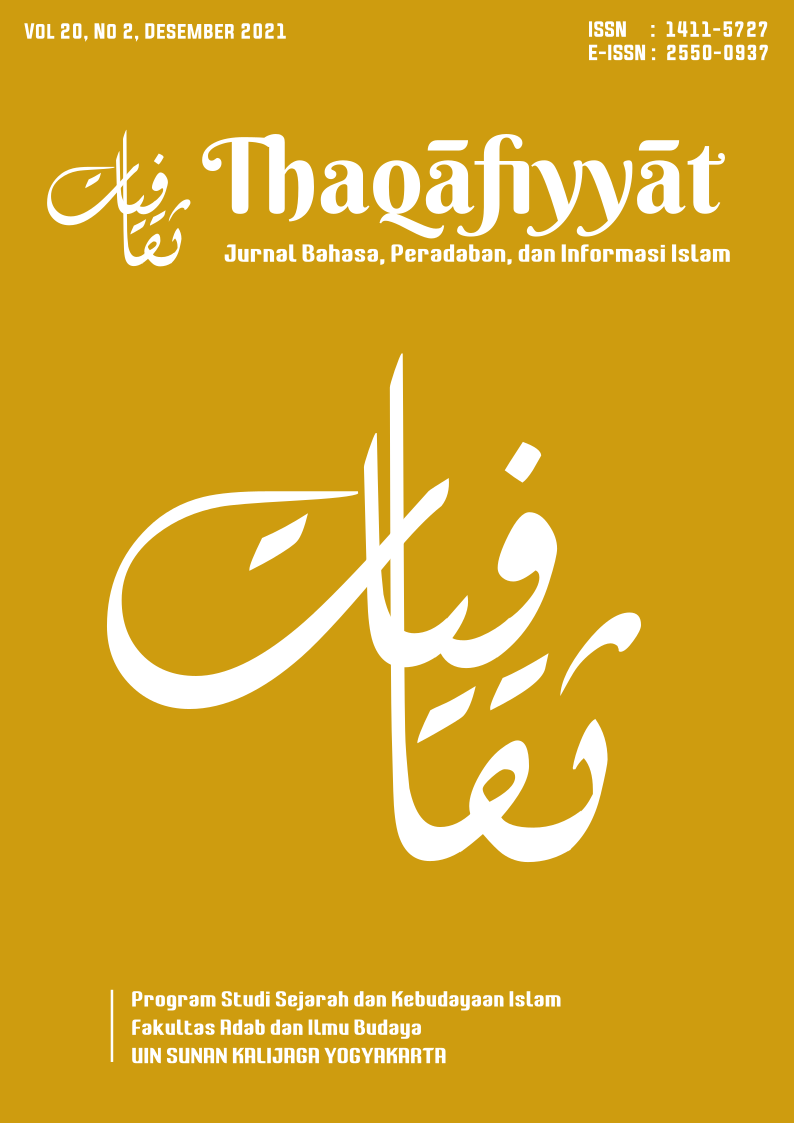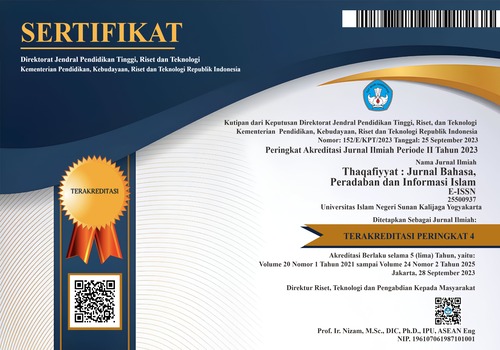Literary Discourse on Quranic Studies: A Historical Study on The Model of Literary Interpretation to The Quran
DOI:
https://doi.org/10.14421/thaq.2022.21202Abstract
Abstract: The aspect of the beauty of language ('ijaz lughawi) is one of the first miracles that emerged from the Qur'an. This aligns with the audience to whom the Qur'an was revealed around 14 centuries ago: people who are very close to the literary tradition. Interestingly, scholars of the Qur'an, from classical to contemporary, see this as an opportunity for studies and still developing and producing various monumental works. Through this paper, the author tries to trace chronologically how the Al-Qur'an and literature meet to become an approach in interpreting the Al-Qur'an. The research in this paper is carried out through essential matters by looking at how the Qur'an was revealed in Arab society, the interpretation practices carried out by the Prophet and his companions, to the contact of the Qur'an with modern literature. This study uses a socio-historical approach by looking at the macro-cultural context of early Arab society and the process of interpretation of the earlier era carried out by the Prophet, companions and tabi'in. This study argues that the emergence of a model of literary interpretation of the Qur'an is closely related to the traditions and culture of Arab society, which are close to literary traditions. Furthermore, this research contributes to the history of interpretation, especially in tracking the various approaches that appear in the study of the Quran.
Abstrak: Aspek keindahan bahasa ('ijaz lughawi) merupakan salah satu keajaiban pertama yang muncul dari al-Qur'an. Hal ini sejalan dengan khalayak yang diwahyukan Al-Qur'an sekitar 14 abad yang lalu: orang-orang yang sangat dekat dengan tradisi sastra. Menariknya, para sarjana Al-Qur'an, dari klasik hingga kontemporer, melihat hal ini sebagai peluang untuk mengkaji dan tetap mengembangkan serta menghasilkan berbagai karya monumental. Melalui tulisan ini, penulis mencoba menelusuri secara kronologis bagaimana Al-Qur'an dan sastra bertemu untuk menjadi sebuah pendekatan dalam menafsirkan Al-Qur'an. Kajian dalam tulisan ini dilakukan melalui hal-hal esensial dengan melihat bagaimana Alquran diturunkan di masyarakat Arab, praktik tafsir yang dilakukan Nabi dan para sahabat, hingga kontak Alquran dengan sastra modern. Kajian ini menggunakan pendekatan sosio-historis dengan melihat konteks makro-budaya masyarakat Arab awal dan proses interpretasi era awal yang dilakukan oleh Nabi, sahabat dan tabi'in. Kajian ini berargumen bahwa munculnya model tafsir sastra al-Qur'an sangat erat kaitannya dengan tradisi dan budaya masyarakat Arab yang dekat dengan tradisi sastra. Lebih jauh lagi, penelitian ini memberikan kontribusi terhadap sejarah tafsir, khususnya dalam menelusuri berbagai pendekatan yang muncul dalam kajian al-Qur'an.
Downloads
References
Abd Moqsith Ghazali. Metodologi Studi Al-Qur’an. Jakarta: Gramedia, 2009.
Abdul Mustaqim. Dinamika Sejarah Tafsir. Yogyakarta: Idea Press, 2016.
Abdurrahim Muhammad. Tafsir Nabawi Khasaisuhu Wa Masadiruhu. Kairo: Maktabah al-Zahra, 1992.
Abdurrahman Rusli Tanjung. “Analisis Tterhadap Corak Tafsir Adabi Ijtima’i.” Analytica Islamica 3, no. 1 (2014).
Aksin Wijaya. Arah Baru Studi Ulum Al-Qur’an. Yogyakarta: Pustaka Pelajar, 2009.
Amin Al-Khulli. Manahij Al-Tajdid. Kairo: Dar al-Mar’rifah, 1961.
Amin Al-Khulli and Nasr Hamid Abu Zaid. Metode Tafsir Sastra. Translated by Khairon Nahdliyyin. Yogyakarta: Adab Press, n.d.
Fadhli Lukman. Menyingkap Jati Diri Al-Qur’an. Yogyakarta: Bening Pustaka, 2018.
Ingrid Mattson. Ulumul Qur’an Zaman Kita. Jakarta: Zaman, 2013.
Jalaluddin al-Suyuthi. Al-Itqan Di ’Ulum al-Qur’an. Beirut: Dar al-Kutub al-’Ilmiyah, 1971.
J.J.G. Jansen. Diskursus Tafsir Modern. Yogyakarta: Tiara Wacana, 1997.
Khalid Abdurrahman. Ushul At-Tafsir Wa Qawaiduhu. Damaskus: Dar al-Nukhais, 1986.
M. Nur Kholis Setiawan. Al-Qur’an Kitab Sastra Terbesar. Yogyakarta: Elsaq Press, 2005.
M. Quraish Shihab. Kaidah Tafsir. Jakarta: Lentera Hati, 2013.
Manna’ Khalil Qaththan. Mabahis Fi ’Ulum al-Quran. Translated by Mudzakir AS. Jakarta: Litera Antar Nusa, 2009.
Mardjoko Idris. Stilistika Al-Qur’an Kajian Pragmatik. Yogyakarta: Karya Media, 2013.
Michael H. Hart. Seratus Tokoh Yang Paling Berpengaruh Di Dunia. Translated by Mahbub Djunaidi. Jakarta: Dunia Pustaka Jaya, 1986.
Muhammad Husain Dzahabi. Tafsir Wa Al-Mufassirun. Vol. 2. Kairo: Maktabah Wahbah, n.d.
Muhammad Yusron dkk. Studi Kitab Tafsir Kontemporer. Yogyakarta: TH Press, 2006.
Mujahid. Tafsir Mujahid. Vol. 1. Mesir: Dar al-Fikr al-Islami, 1989.
Philip K. Hitti. History of Arabs. Jakarta: Serambi Ilmu, 2002.
Sukamta. majāz & Pluralitas Makna Dalam Al-Qur’an. Yogyakarta: Adab Press, 2009.
W. M. Watt and R. Bell. Introduction to The Qur’an. Edinburgh: Edinburgh University Press, 1991.
Wali Ramdhani. “Amin Al-Khulli Dan Metode Tafsir Sastrawi.” Jurnal IAIN Langsa 2, no. 1 (2017).
———. Menelusuri Makna Puasa Dalam Al-Qur’an. Bandung: Mizan, 2011.
Downloads
Additional Files
Published
Issue
Section
License
Copyright (c) 2023 Nuzul Fitriansyah

This work is licensed under a Creative Commons Attribution-NonCommercial-ShareAlike 4.0 International License.
Authors who will publish with this journal agree to the following terms:
- Thaqafiyyat: Jurnal Bahasa, Peradaban dan Informasi Islam publishes all articles entirely in full text.
- It is permissible for readers to download and to use it for scientific purposes and scientific dissemination.
- Authors retain copyright and grant the journal right of first publication with the work simultaneously licensed under a Creative Commons Attribution License that allows others to share the work with an acknowledgement of the work's authorship and initial publication in this journal.
- Authors are able to enter into separate, additional contractual arrangements for the non-exclusive distribution of the journal's published version of the work (e.g., post it to an institutional repository or publish it in a book), with an acknowledgement of its initial publication in this journal.
- Authors are permitted and encouraged to post their work online (e.g., in institutional repositories or on their website) prior to and during the submission process, as it can lead to productive exchanges, as well as earlier and greater citation of published work.









